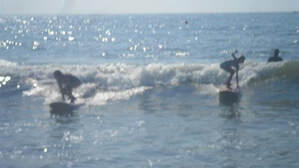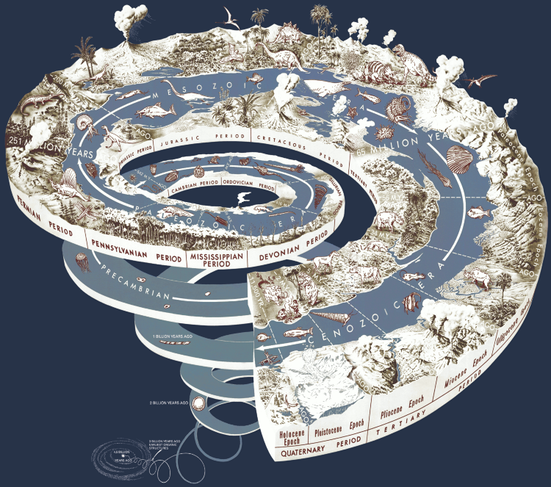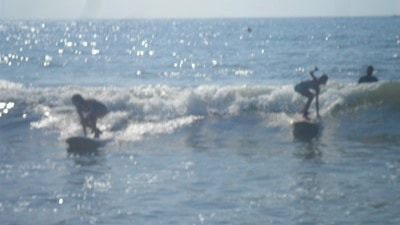Society needs to evolve just as our DNA does.Human brains are wired for categorization, thought by many to be an evolutionary advantage and a condition for rational thought. It is no surprise then that humans have classified the history of time on Earth into eras of clearly defined periods marked by some characteristic. Some eras are shorter while others span much longer time frames. A person can have eras of their own, viewing their own personal lifetime in various periods, such as being a teenager or married. Or we can view the categorization of something much larger like the timeline of the origins of our universe. In any case, what happens in the eras of any timescale defines the uniqueness of that time.
The usage of chronology for life makes sense since everything alive is evolving into something different from what it was in a prior state. In looking at the life span of the planet Earth, the home to all who are reading this, it is estimated to be 4.5-billion years old since it was birthed from a nebula of particles from our Sun during the Hadean era. Immediately after was the beginning of the Archean era, 4-billion years ago, when the Earth’s first continents were formed, then shortly after, our oceans. It was this blessing of water that created the first signs of life 3.5-billion years ago. Photosynthetic life eventually developed after falling in love with the energy of the sun and produced oxygen 2-billion years ago during the Paleoproterozoic Era. Water and oxygen together created the atmosphere 1-billion years ago during the Proterozoic era leading to complex multicellular life forming in the Cambrian era 580-million years ago. As these complex multicellular life forms developed, events with sudden climatic changes such as an ice age, shifted the scale of physical evolution of all species of life existing at that time. Diverse hard-shelled animals first appeared 250-million years ago in the Mesozoic Era spawning the dinosaurs. When the dinosaurs became extinct, birds survived helping to develop the next set of life along with great change in the terrestrial vegetation leading up to the Cenozoic period about 65-million years ago. This time marked the proliferation of insects, and fish joining the birds in this process of proliferation. Periods of global heating and cooling over the next several million years created tectonic shifts in Earth’s continental plates and the development of land animals and their eventual migration around the globe marking the Pliocene Era 5-million years ago. Eventually animal migration allowed for the intermingling of species giving rise to a diverse set of mammals from horses to cats and homo habilis during the Pleistocene Era 2-million years ago. As homo erectus spread throughout the world 150,000 years ago, they contributed to the extinction of the large animals that they hunted. Since then, small scale climate shifts and continued migration evolved homo erectus into the humans we are today, homo sapiens. This gives our current Era of the last 11,700 years the name Holocene, dubbed “The Age of Man” as it plays spectator to most of humanity’s recorded history and the rise and fall of all its civilizations since then. Anatomically, modern homo sapiens evolved within the last 150,000 years defining only 0.004% of Earth’s whole geographic history. While all organisms influence their environments to some degree, few have ever impacted Earth as much, or as fast, as our species has done during our short 0.004% stay. Modern humans are changing the world, ushering in a new era in geologic time, currently proposed to be called Anthropocene. This concept of a new era has been discussed and debated as the time in history where human influences became so great, that it changed the future of Earth and humanity all together. This is the first time that an era is credited to a particular species, the human. But is this really something so dramatic? The impetus for leaps of growth in life on Earth usually include destruction then recovery. The changes currently being observed in our ecosystem are parallel with major events of past eras that developed the landscape we see today and the photosynthetic organisms that released oxygen into our atmosphere for us to breathe. The only distinction this time around is how quickly our impact has been and who is doing it. Humans have wandered the Earth for thousands of years but never has our capacity to alter the Earth’s ecosystem at a larger scale been more prominent than it is today. When the Anthropocene Era began is under debate by scholars in various disciplines. To think about when our impact first began to alter the Earth’s ecosystem forever is surely not an easy feat to do. Geologists have been able to observe differences in rock to tell Earth’s story up to this point, but dissecting current time is harder to do since looking back is what Geologists are experts on, contemplating the present is not their specialty. From a philosophical perspective however, there was a beginning point when we became a driver instead of a passenger along the chronology of time. Some theories based on atmospheric evidence suggest the era kicked off with the Industrial Revolution in the late 18th century due to human population growth and the rise of carbon dioxide. This was a time when humans first began to play with chemical manufacturing, and the building of machines. Others connect the beginnings to earlier events, such as the rise of agriculture and the domesticating of animals with the Neolithic Revolution 12,000 years ago. This direct change from hunting and gathering resulted in societies being developed and the continued rise and falls of them since. Further, many believe that the very recent onset of our dependency on technology since the 1950s has fueled exponential growth to the point that some call it the “Great Acceleration.” Then the Internet came, which revolutionized society like no other civilizations of the past. By building an interconnected framework around the globe, using satellites and computers to share data, we are moving energy in a coordinated manner around the Earth like never before, building our collective intelligence that can easily resemble a brain. Several trillion synapses are available in our brain for neuron communication, allowing for the processing of an enormous amount of information every minute. Our global system of communication is too processing data in amounts that are difficult to comprehend. For example, every minute email users send over 200 million messages. In the last 30 years, almost half of the world’s population used the internet connecting 2.5 billion people instantly like never before. This electronic infrastructure allows for the fundamental mathematical laws that nature follows to produce exponential growth. Perhaps we are living with the right conditions set up to allow for another boom of diversification. Although I agree that today’s technology revolution has provided the catalyst to propel us into the next form of rapid growth and development of our species, I prefer to connect the beginning of the Anthropocene Era with the time homo sapiens’ consciousness expanded into a different form. It can be easily argued that all living things are conscious in some aspect, but many would agree that advanced consciousness like our own is unique. We broke through into a new level of consciousness that hadn’t existed before. This too has arguments about its beginnings, but my general feelings lead me to believe that consciousness began in the 6th century BC with the co-evolution of language and larger brain capacity that allowed humans to discover they had minds. So when did the proper neuronal connections in our brains happen to allow us to become differently intelligent than other living things? From observing my own children I find that true advanced consciousness begins when a toddler realizes they are separate and distinct from their parents. Toddlers realize that their wants are not the same as their parents, and rebellion begins–leading to the term “terrible twos.” If you extend this idea to humanity, when did we rebel? When were we not happy with what the Earth provided for us to such an extent that we decided to take the wheel and drive? When did we become rational enough to have insights? When did humanity as a whole hit its toddler years? Prior to our consciousness becoming so advanced we were a lowly species, dwelling on Earth in small proportions. Our lives were simple, our impact to our environment was slim. We weren’t burning fossil fuels or driving cars which made our air dirty. We weren’t polluting the oceans or dropping nuclear bombs. We certainly weren’t socially connected around the globe like we now are. The ability for us to destroy our own habitat was not possible, it was left up to the forces larger than us; the solar winds and the rock particles floating past us in the sky. Relative to the age of Earth, in a very short period of time we have managed to push the extinction of species like the Zanzibar Leopard and West African Black Rhinoceros, culminating in large losses of tropical rain forests, and dramatic depletion of our ozone layer. To keep pace with our current lifestyle, we need places to bury garbage, chop down trees for paper, use water for new purposes such as doing laundry, breathe pollution from our cars, and destroy land and wildlife as our population increases. People are dying from not having food or water, and being killed over greed. Our love affair with plastic has damaged coral reefs disrupting the oceans’ own ecosystem. It’s estimated that we have affected about 80% of Earth’s surface all by our own doing. This number had recently doubled since the 1960s. I believe that the Anthropocene Era encompasses more than humans impacting Earth; it’s also about us as humans affecting ourselves. Chemicals we use every day are altering what’s primal to us, leading to cancer becoming more prevalent. Parts of our genome simply cannot survive a situation where the environment suffers from the full overload of toxins we currently live in. Through cancer and disease our bodies are working out new genomic defects experimenting to see what survives. Unfortunately, we cannot evolve as fast as what we are exposing ourselves to via chemicals in the foods we eat and in the air we breathe. Evolution of living organisms takes thousands to millions of years to happen. We simply haven’t given our bodies enough time to adjust to the exponential changes we are introducing to our environment. Further, it is possible we are blocking any type of evolutionary progress we are making. With the rise of medication and prescription drugs, it’s possible that we are sustaining life and the passage of genes that are diseased, allowing nature to keep reproducing that which it is not supposed to. The correlation between human society and environmental impact has a long history within our short human footprint. The rise and fall of so many civilizations proves that humans have yet gained the ability to evolve into a society that is sustainable. Many upon many have risen and fallen and the phoenix will continue to rise once again until we get it right. From a more current societal perspective, there is a revolution of sorts going on fueled by the new interconnection of the world and its embracement by the younger Millennial and Z generations. The gap between the ideals of past generations and these newer ones is very large. If the governments and societies of developed nations do not adapt to the change that the Millennials and Z’s require, it will collapse as a whole, just as pieces of it have already. We are at the point of having a changed relationship with our home planet. It’s the beginning of what can be a short or very long “Age of Man.” Depending on how we approach this continued exponential period of growth, it will either be one of decline or one of growth into something fitter. Where will our newfound global awareness and intelligence take us? Research data clearly shows that the exponential growth is not letting up. If we continue to cut down forests, emit more pollution, push species to extinction, and pollute our oceans, something major is going to happen, if it hasn’t begun already. The Earth has survived many eras in the past through the regeneration of its surface as necessary. Humans on the other hand have not held billions of years of precedent like that. Current aboriginal culture thriving today may be the ones that survive any future cataclysmic changes when they come, as they are the ones most closely living in alignment with the needs of the Earth, away from these perils of modernization. From whichever angle you look at our current situation, it’s hard to deny the culmination of ripe circumstances for change. It is perhaps time for the Anthropocene Era to begin the branching out of its diversification phase, or maybe extinction so that more fit life forms can thrive. When it comes to society and human consciousness, Darwinism still exists in its primal message. Only the fittest will survive; yet there is always life somewhere else to start as the catalyst for the new. At our basis we are elements from the cosmos. When you bash together many different forms of molecules in any state, new forms develop as the current environment evolves. This theme of constant change is innate, sitting within the molecular dust that has made us into the physical beings we are today. Conditions always have to be just right for changes to begin. This piece is one of 25 others in Thought Notebook Journal: Parallelism Of Cyclicality. Read the issue to learn more about our observations while studying the cyclical nature of our world.
0 Comments
Last night I basked in the light of the Full Moon and requested clarity on the recent grief I was experiencing with the death of my favorite musician, DJ i_O, also known as Garrett Lockhart. I had a relationship with i_O through his music and his death hit me profoundly. I never met him, I was fairly new to his music, but there was something about his energy that lit up my spirit. I noticed this igniting whenever I heard his music or watched him virtually perform. We met at the very beginning of the pandemic, back in March 2020, and he kept my internal flame lit when chaos and change was occurring externally. He had no idea he had this effect on me, and so many others, during the stress 2020 had created for everyone. When he recently died, this ignited fire inside of me flickered with pain, a piece of me was extinguished. The past four days I reflected hard-core on why I felt this emptiness and pain inside of me, regarding a person I never personally knew. Thanks to the energy of last night’s Gemini Full Moon falling on my face, I was able to understand why I was so connected to him and why his energy lit up my spirit. Over the past several years, my thoughts, feelings, and beliefs began transmuting, and i_O’s entire persona churned my wheels of metamorphose faster and provided a sense of confirmation of what was changing for me.
i_O: — > Taught me to be authentic, to be myself and not to care what others think, because it doesn’t matter. What matters is being me and living in my own truth, and doing so is not selfish. That I must have confidence to step into myself, in its truest form, and be comfortable doing so, without fear of abandonment or rejection, which deflates my power. Instead, all humans have value and worth which gives us power. — > Proved to me that living with passion for something is necessary. That our lives only have meaning in how it affects others lives and serving people is a big part of life’s purpose as we are all connected in its fabric. That being fulfilled in some way makes life worth living and without it we are challenged deeply with pain and suffering. — > Reminded me that it’s okay to question everything, to think deeply about things, and to not be fine with what’s happening around us. That questioning the establishment is necessary and that status quo isn’t necessarily the right way. That it’s okay to not want to be conditioned and conformed. That it’s alright to want freedom from the illusions and call them for what they are, even if it’s not popular. Instead, finding and doing what makes me happy is uber important as a sense of rebellion against the falsehoods of what’s supposed to make us happy. — > Restored my faith in humanity. That it’s okay to be an individual, yet part of a larger community. That I need to find my people and not try to fit into just any circle, but instead attract those that are too transmuting. They do exist, and more people are waking up and shedding old skin just like me. That there are people out there, on my vibration, that my spirit cannot wait to meet. In the meantime, I cannot be afraid to walk alone. — > Showed me I can create a life of love amongst infinite possible ways to do it, and we don’t need to compete with each other while doing it. Starting with love for ourselves, then doing what we love, and subsequently this will spread love to others. That I must do what comes easy to me, a sense of effortless manifestation as a sign we are on the right track leading with love. Thank you i_O for helping me gain the needed confidence in knowing I was already on the right path in my awakening. May your spirit live alive through these changes in myself and those others you have also transmuted. Even though he believed nothing mattered, he also believed everything we do affects others, and it is my hope that his death will evoke change in the people he impacted, which in turn will serve humanity well. I love photos and their ability to capture a moment in time. Since we are bound by the laws of the space-time matrix, we are unable to go back, to review the day, and see a play by play. Unless we have a reality TV show, our lives are not videotaped for us to rewind and watch. Instead we have pictures, that help tell our story, present the environment, gather emotion, and capture that exact moment that is so unique, nothing will ever be exactly that same way again. I do think, however, that we take the power photos give us for granted. Studies show that what we remember about our past really is only 37% true — the rest is made up. Its only how we perceived all the associated sensory information is what is true. This is done in order to understand it. On average, we humans are bombarded by 1,600 commercial messages a day, 80 we consciously notice, and only 12 provoke a positive or negative response. We filter stimuli around us to not induce overload in our brains. We never evolved to handle information at the capacity we experience it today… or at least not yet. This is called selective attention. What we hear, we process against our belief systems, which is called selective distortion. This is because as humans we have an urge to explain things, it’s a part of our physiology of our brain — this is how Greek mythology was born. We distort in order to understand. And because of selective retention, only a small fraction of any of the stimuli we process is actually retained. It is due to this selectiveness that perceiving is just as powerful as awareness. I call this percivision: the act of perceiving and gaining understanding into the nature of reality. To make matters even more complicated, other studies have shown that we alter our memories, every time we recall them. In fact, our memory is an elaborate party of protein, enzymes, electrical and chemical signals between neurons in the brain. This scaffolding can be interfered with other processes going on in our brain, such as emotional and physical reactions to the world around us. Thus, making it possible to alter these paths, depending on what’s going on with us when it’s recalled. MRI scans done in these studies have determined that both the amygdala and hippocampus work together to create our false memories. The hippocampus is related to long-term memory formation whereas the amygdala deals with emotions and social situations. Memories of our reality can then be altered based on where are, who we are with, and how we are feeling at the time of recollection. Therefore, when we think about what our 5th grade teacher was like, or how our first date really went, what we recall may be incorrect. Almost makes reality a word that has no meaning, since it is possible we are unable to physiologically recall it 100%. This is one of many reasons why I am fan of pictures. Looking back at a snapshot of our lives, is the closest thing we have to reality, if it does exist.  In this photo, my niece and brother are surfing. I remember that I sat out and left my husband and daughter with them, since I kept wiping out. I simply just could not get on that board and surf. Or, maybe I saw a shark and got scared? Or, maybe I never got in the water and met up with them later? Who knows that my reality was that day. What this picture does prove about reality is that my brother and niece were surfing and they both were able to get on the boards! There is no evidence that I was able to. |
Kat LahrChoose to live a consciously evolved life. Archives
April 2022
Categories |
|
© 2024 Inner AlcheME
|





 RSS Feed
RSS Feed